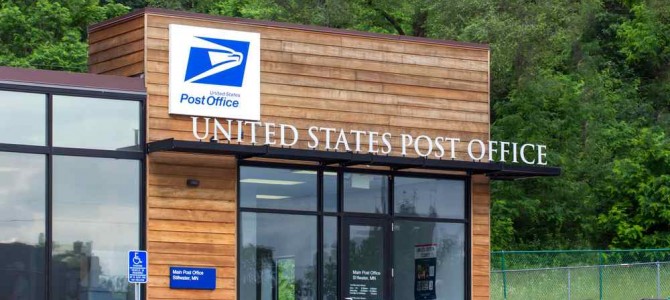Privatization is the answer for saving the U.S. Postal Service from the financial crisis it faces in the digital age, libertarians declared at a lecture sponsored by the Cato Institute yesterday. Mail volume has decreased dramatically, spelling disaster for a government corporation technically self-funded by postage revenue.
“The postal service is like the Hindenburg,” said James Gattuso, a senior research fellow at the Heritage Foundation. “It’s hovering over New Jersey, it’s in trouble, and our job is to keep it from falling on the towns and villages below.”
According to Gattuso, first-class mail is down 40 percent since 2007, simple correspondence is down 80 percent since 1987, and holiday cards are down 30 percent since 2012.
The postal service also lacks needed oversight due to a managerial crisis: what should be an 11-member board has been reduced to one postmaster general, one governor, and a deputy postmaster general, noted Kevin Kosar, a senior fellow at the R Street Institute.
The lowest-volume 4,000 post office locations in the United States only average four customers a day, added Chris Edwards, director of tax policy studies at Cato.
“It’s crazy—they ought to be closed,” he said. “But because the USPS is a government-owned entity, Congress micromanages and prevents those sorts of rational business decisions.”
Congress Is Failing to Fix the Problem
Indeed, although postal reform bills are afloat in both the House and Senate, the reforms proposed inside are mostly incremental and aimed at temporarily reducing costs—not the big, visionary changes needed for real improvement. According to Kosar and Gattuso, members of Congress continually block reform attempts that would truly deal with the situation.
“We really need to think about what a twenty-first-century postal service would look like, and even, do we need one?” Kosar said. “Those questions are just very difficult to take up in Congress, so these bills mostly deal with pensions, retiree health-benefit costs—they will leave the Postal Service looking much like it has since the 1970s.”
“Transforming the Postal Service into something that might survive is a lot more than just cutting,” Gattuso agreed. “It needs to be innovative.”
Innovation Requires a Free Market for Mail
But entrepreneurial innovation can only come after ending the U.S. Postal Service’s monopoly on mail services, Edwards said. By privatizing the USPS and opening the mail service market to competitors, he argued, entrepreneurs can be free to innovate and improve. Privatization would increase efficiency in mail service, get rid of government micromanagement in the business, and open the market to give Americans more options for mail.
Edwards, author of the recent Cato study “Options for Federal Privatization and Reform Lessons from Abroad,” argued Americans should consider privatizing the USPS along the broader global context of what he calls the “privatization revolution.”
While privatization is still radical to the U.S. Congress, European nations have increased their efficiency by moving all kinds of companies to the private sector, including airlines, passenger rail services, electrical utilities, and postal services.
“[British Prime Minister] David Cameron in 2013 was able to go ahead and privatize the Royal Mail,” Edwards said. “They knew it wasn’t radical, they knew it would work, and they knew it would improve service.”
Private Mail Offers Universal Service in Europe
But how would Americans continue receiving the “universal service” the USPS is famous for if the mail service were privatized and open to competition? Europe, Edwards said, proves this isn’t a problem.
In the European Union, for instance, which requires universal postal service in its member nations, primary universal service providers usually calculate a net cost of operations, then calculate the additional costs of delivering to every household. The government can then provide a direct subsidy to the company to help with those additional costs of universal delivery. For instance, Deutsche Post in Germany is required to deliver to all households, but receives a subsidy from the government in cases where that requirement would cause the company to lose money.
“The European Union calculates that extra subsidy really only averages about 5 percent of revenues,” Edwards said. “So you really don’t need much of a subsidy to make it happen. We don’t need a monopoly to have universal service in the United States.”
While he argued Europe proves full privatization is successful, he admitted an alternate option could be partial privatization.
Some researchers have suggested the United States should “keep the government USPS just to deliver the final mile to all United States households,” he said. “The USPS would provide the universal service but then allow the rest of the system, the collection and transportation, the sorting of mail, to private enterprise.”
Do We Even Need Universal Service?
Edwards also added that perhaps the United States needs to reevaluate the definition of universal service entirely. In Europe, for example, many countries offer fewer than six days of delivery or use cluster post boxes for neighborhoods in order to cut costs.
“In the email world we live in, I question why we need a universal service at all,” Edwards said. When advertising mail is 60 percent of the mail in your postal box, and two-thirds of Americans’ bill payments are made online, why do we need this service at all?
“Congress is essentially imposing a monopoly on our mail system essentially just so that we can continue receiving junk mail in our mailboxes six days a week,” he concluded. “The USPS ought to be privatized and open to competition.”









